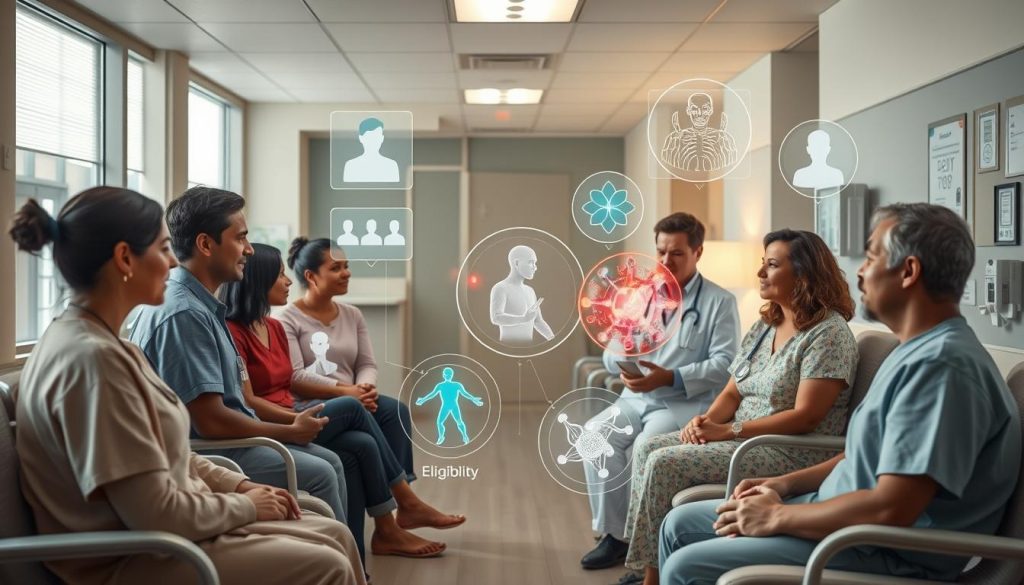A new hope in the fight against cancer is CAR T cells therapy. It’s a groundbreaking treatment for blood cancers. It uses the patient’s immune system to find and kill cancer cells. This makes it a personalized way to fight cancer.
This therapy starts with a special process. It takes the patient’s T cells, a type of white blood cell, and changes them in a lab. The T cells are then given special receptors. These receptors help them find and destroy cancer cells.
Studies have shown great results with CAR T cells therapy. It has been approved by the FDA for some cancers. As research keeps going, it could change how we treat cancer. It gives new hope to those who have tried other treatments.
What is CAR T Cells Therapy?
CAR T cells therapy is a new way to fight cancer. It uses the body’s immune system to attack cancer cells. This method involves changing a patient’s T cells to target and kill cancer.
First, T cells are taken from a patient through a process called leukapheresis. These cells are then modified in a lab. Scientists add a gene that makes the T cells recognize and attack cancer cells.
Understanding Chimeric Antigen Receptors (CARs)
Chimeric antigen receptors are key to CAR T cells’ success. They have three parts:
- An extracellular domain that recognizes and binds to a specific antigen on the cancer cell surface
- A transmembrane domain that anchors the receptor to the T cell membrane
- An intracellular domain that signals the T cell to activate and proliferate upon antigen binding
The design of the CAR is very important. Researchers pick the target antigen carefully. They want it to be on cancer cells but not on healthy cells.
The Process of CAR T Cell Therapy
After the T cells are modified, they are grown in the lab. This makes sure there are enough for treatment. The patient then gets chemotherapy to prepare their body for the T cells.
The CAR T cells are then given back to the patient. They start looking for and killing cancer cells. The table below shows how long CAR T cell therapy usually takes:
| Step | Duration |
|---|---|
| T cell collection (leukapheresis) | 1-2 days |
| Genetic modification and expansion | 2-4 weeks |
| Lymphodepleting chemotherapy | 3-5 days |
| CAR T cell infusion | 1 day |
| Monitoring and follow-up | Several weeks to months |
The CAR T cells keep growing and watching for cancer. This could lead to long-term remission or even a cure for some patients.
How CAR T Cells Therapy Works
CAR T cells therapy is a new targeted cancer therapy. It uses the patient’s immune system to fight cancer. This personalized medicine method changes T cells to attack cancer cells.

Targeting Cancer Cells
The CARs on T cells find specific antigens on cancer cells. These antigens help the T cells target cancer without harming healthy cells. After being infused, the T cells find and bind to cancer cells.
Activation and Proliferation of CAR T Cells
When T cells bind to cancer cells, they get activated and grow fast. This process releases signals that boost the immune fight against cancer. As they multiply, they become a strong force against cancer cells.
| Step | Description |
|---|---|
| 1 | T cells are collected from the patient’s blood |
| 2 | T cells are genetically modified to express CARs |
| 3 | Modified CAR T cells are expanded in the laboratory |
| 4 | CAR T cells are infused back into the patient |
| 5 | CAR T cells target and attack cancer cells in the body |
CAR T cells therapy is a big step forward in adoptive cell transfer. It offers a targeted and personalized way to fight cancer.
CAR T cells therapy is promising because it targets cancer cells without harming healthy ones. As research grows, it might help more people with different cancers.
Types of Cancer Treated with CAR T Cells Therapy
CAR T cells therapy has changed how we treat some cancers, mainly blood cancers. This cancer treatment has been approved by the FDA for certain lymphoma and leukemia types.
The most common cancers treated with CAR T cells therapy include:
- Diffuse large B-cell lymphoma (DLBCL)
- Follicular lymphoma
- Mantle cell lymphoma
- Acute lymphoblastic leukemia (ALL)
- Multiple myeloma
Success in treating blood cancers with CAR T cells has led to more research. This research aims to use it for other cancers too, like:
| Cancer Type | Potential CAR T Cell Targets |
|---|---|
| Solid tumors | Mesothelin, HER2, EGFR |
| Breast cancer | HER2, ROR1 |
| Prostate cancer | PSMA, PSCA |
| Glioblastoma | EGFRvIII, IL13Rα2 |
Using CAR T cells in solid tumors is harder because of the tumor environment and side effects. But, researchers are working hard to solve these problems. Improvements in CAR design, target selection, and combining therapies could make CAR T cells therapy work for more cancers in the future.
“The success of CAR T cells therapy in blood cancers has opened up exciting possibilities for treating other types of cancer. We are just scratching the surface of what this innovative therapy can do.”
As research goes on, the hope is to make CAR T cells therapy a common treatment for more cancers. This could improve life quality and outcomes for cancer patients.
Advantages of CAR T Cells Therapy
CAR T cell therapy is a new way to fight cancer. It uses the body’s immune system to target cancer cells. This method is more precise and tailored to each patient.
Personalized Treatment Approach
One big plus of CAR T cell therapy is its personalized medicine aspect. It changes a patient’s T cells to attack cancer cells. This makes the treatment fit the patient’s cancer better.
This approach is gentler on healthy cells. It causes fewer side effects than old treatments like chemotherapy or radiation.
Potential for Long-term Remission
CAR T cell therapy has been very effective in some blood cancers. It has helped patients with acute lymphoblastic leukemia (ALL) and diffuse large B-cell lymphoma (DLBCL) a lot. Many patients who tried other treatments first got better after CAR T cell therapy.
| Cancer Type | Complete Remission Rate |
|---|---|
| Acute Lymphoblastic Leukemia (ALL) | 83% |
| Diffuse Large B-Cell Lymphoma (DLBCL) | 52% |
This therapy gives hope to those who didn’t get better with other treatments. As scientists learn more, CAR T cells might help with other cancers too. This could lead to more people living longer.
“CAR T cell therapy represents a new frontier in cancer treatment, providing personalized and potentially curative options for patients who have exhausted conventional therapies.” – Dr. Sarah Johnson, Oncologist
The Development of CAR T Cells Therapy
CAR T cells therapy is a new way to fight cancer. It comes from years of research and clinical trials. Scientists, doctors, and companies have worked together to make it better for cancer patients.
Early Research and Clinical Trials
The idea of using T cells to fight cancer started in the 1980s. But it wasn’t until the late 1990s and early 2000s that we got the CARs we use today. Early clinical trials showed it was safe and worked for some blood cancers.
In 2011, a big step was made when a CLL patient got better after CAR T cell treatment. This was the first time it worked for someone with no other options. This success led to more trials and more money for research.
FDA Approval of CAR T Cell Therapies
Good results from early trials led to fast work on CAR T cell therapies for different cancers. In August 2017, the U.S. Food and Drug Administration (FDA) approved the first CAR T cell therapy, tisagenlecleucel (Kymriah). It was for kids and young adults with a certain type of leukemia.
“The FDA approval of the first CAR T cell therapy was a historic moment in cancer treatment, giving new hope to those who had no other options.” – Dr. Carl June, Pioneer of CAR T Cell Therapy
More CAR T cell therapies got FDA approval for blood cancers like lymphoma. These successes have led to more research. Now, scientists are looking to use CAR T cells for other cancers, including solid tumors.
Patient Eligibility for CAR T Cells Therapy
When looking at cancer treatment options, knowing who can get CAR T cells therapy is key. This method has shown great success in treating some blood cancers. But, not every patient is a good fit for this treatment.
To be eligible for CAR T cell therapy, several things matter. These include:
- Type of cancer: CAR T cells therapy is approved for specific blood cancers, like acute lymphoblastic leukemia (ALL) and certain lymphomas.
- Previous treatments: Patients who have tried many treatments without success or have had a relapse might be good candidates.
- Overall health status: The patient’s overall health, including how well their organs work and their performance status, is checked to make sure they can handle the treatment.

Here’s a quick summary of what makes someone eligible for CAR T cell therapy:
| Criteria | Description |
|---|---|
| Cancer Type | Specific blood cancers (e.g., ALL, lymphoma) |
| Previous Treatments | Multiple lines of treatment, relapsed or refractory disease |
| Overall Health | Adequate organ function and performance status |
Remember, each case is different when it comes to CAR T cell therapy. Patients and their families should talk to their healthcare team. They can decide if this treatment is right for them.
The decision to pursue CAR T cells therapy is a collaborative one, involving the patient, their loved ones, and the medical team. Together, they can weigh the benefits and risks, and decide the best path forward.
As research keeps moving forward, the hope is to make CAR T cell therapy available to more patients. This could offer a new hope for those fighting different types of cancer.
The CAR T Cells Therapy Procedure
The CAR T cells therapy is a complex process. It starts with collecting a patient’s T cells. These cells are key to the body’s immune defense.
T Cell Collection and Genetic Modification
The first step is collecting T cells through leukapheresis. This method draws blood and separates out the T cells. Then, these cells are sent to a lab for genetic changes.
In the lab, the T cells get a special gene. This gene helps them find and attack cancer cells. The gene is added using a viral vector.
Lymphodepletion and CAR T Cell Infusion
Before the CAR T cells are given back, patients go through lymphodepletion. This is a treatment that lowers the number of lymphocytes. It makes room for the CAR T cells to work better.
After lymphodepletion, the CAR T cells are infused. The amount given depends on the treatment plan and the patient’s health.
| Step | Description |
|---|---|
| 1. T Cell Collection | Patient’s T cells are collected through leukapheresis |
| 2. Genetic Modification | T cells are engineered to express CARs targeting cancer antigens |
| 3. Lymphodepletion | Patient undergoes chemotherapy or radiation to deplete lymphocytes |
| 4. CAR T Cell Infusion | Genetically modified CAR T cells are infused back into the patient |
The CAR T cell therapy procedure is a complex but promising approach to harnessing the power of a patient’s own immune system to fight cancer.
After infusion, the CAR T cells grow and start attacking cancer cells. This targeted attack is very effective against cancer.
Potential Side Effects and Risks
CAR T cells therapy has shown great success in fighting certain cancers. But, it’s important to know about the possible side effects and risks. Patients may face adverse reactions that need careful watching and quick action.
Cytokine Release Syndrome (CRS)
CRS is a common side effect of CAR T cells therapy. It happens when the immune system gets too active, releasing a lot of inflammatory molecules. Symptoms can range from mild fever and flu-like symptoms to serious issues like low blood pressure, trouble breathing, and organ problems.
The severity of CRS is graded from 1 to 4. The higher the grade, the more severe the symptoms. Here’s a table showing the CRS grading system:
| Grade | Symptoms | Management |
|---|---|---|
| 1 | Mild fever, fatigue, nausea | Supportive care, close monitoring |
| 2 | Moderate fever, hypotension, hypoxia | Oxygen support, fluids, tocilizumab |
| 3 | High fever, severe hypotension, respiratory distress | ICU admission, vasopressors, tocilizumab |
| 4 | Life-threatening symptoms, organ failure | Aggressive ICU care, immunosuppression |
Neurological Toxicities
Patients may also face neurological side effects from CAR T cells therapy. These can include confusion, delirium, seizures, or even brain swelling. These issues are thought to be caused by CAR T cells entering the brain and causing inflammation.
It’s important to quickly recognize and manage these neurological side effects. Treatment might involve corticosteroids to reduce inflammation and anticonvulsant medications to control seizures.
Management of Side Effects
Managing side effects in CAR T cells therapy requires a team effort. Oncologists, critical care specialists, and neurologists work together. They closely watch for signs of CRS and neurological side effects, acting quickly based on the severity.
Early recognition and prompt management of side effects are key to ensuring the safety and well-being of patients undergoing CAR T cells therapy.
Even with risks, the benefits of CAR T cells therapy often outweigh them for many patients with advanced or relapsed cancers. As research and technology improve, the safety of this treatment is expected to get even better.
Success Stories and Patient Experiences
CAR T cells therapy has changed many cancer patients’ lives. It brings hope when other treatments fail. These stories show the amazing power of this treatment.
Emily Whitehead was just 5 when she got acute lymphoblastic leukemia. She tried chemotherapy twice but it didn’t work. Then, her parents tried CAR T cell therapy. It worked, and Emily has been cancer-free for over 10 years.
Doug Olson was one of the first to try CAR T cell therapy for chronic lymphocytic leukemia in 2010. Over 10 years later, he’s in remission and living a full life. His story shows how effective this treatment can be.
“I feel like I have a second chance at life. CAR T cell therapy gave me hope when I thought there was none left.”
Many patients have had similar success with CAR T cell therapy. Their stories show how it has changed their lives:
| Patient | Cancer Type | Outcome |
|---|---|---|
| Sarah | Non-Hodgkin lymphoma | In remission for 3 years |
| Michael | Multiple myeloma | Significant tumor reduction |
| Jessica | Acute myeloid leukemia | Cancer-free for 18 months |
These stories remind us of the life-changing power of CAR T cell therapy. As research grows, this treatment gives hope to those facing tough cancer diagnoses.
Current Limitations and Future Directions
CAR T cells therapy has made great strides in treating blood cancers. Yet, there are hurdles to cross. Researchers are working hard to improve CAR T cells and use them for other cancers too.
Improving CAR T cells’ accuracy and strength is a key focus. By fine-tuning the car t cell design, scientists aim to make treatments more precise. This will help target cancer cells better and reduce harm to healthy cells.
Expanding to Other Types of Cancer
CAR T cells work best for blood cancers like leukemia and lymphoma. But, researchers want to use them for solid tumors too. Solid tumors are harder to tackle because of their complex environment and varied nature.
Researchers are looking into several strategies. These include finding new targets for CAR T cells, making them hit multiple targets at once, and helping T cells fight through the tumor’s defenses.
Combination Therapies
Combination therapies pair CAR T cells with other cancer treatments. This mix aims to boost the treatment’s success and lasting effects.
Some possible combinations include pairing CAR T cells with checkpoint inhibitors or targeted therapies. These combinations could make treatments more effective.
| Combination Therapy | Rationale |
|---|---|
| CAR T cells + Checkpoint inhibitors | Blocking immune checkpoints may enhance CAR T cell function and persistence |
| CAR T cells + Targeted therapies | Combining CAR T cells with drugs that target specific molecular pathways in cancer cells may improve treatment outcomes |
“The future of CAR T cell therapy lies in its ability to change cancer treatment. It offers a personalized and targeted approach. With ongoing research, we aim to overcome current challenges and help more patients.”
Cost and Accessibility of CAR T Cells Therapy
CAR T cells therapy is a game-changer for some cancers, but it’s pricey. It can cost hundreds of thousands of dollars per patient. This makes it hard for many to get this potentially life-saving treatment.
Several things make CAR T cells therapy expensive. It involves complex T cell modification, specialized facilities, and intensive care. But, efforts are underway to make it more affordable and accessible.
Insurance coverage for CAR T cells therapy varies. Some private insurers and government programs like Medicare cover it for certain cases. Yet, patients might face big out-of-pocket costs.
“No one should have to choose between their health and their financial well-being. We must work together to ensure that all patients who can benefit from CAR T cells therapy have access to this revolutionary treatment.”
Many initiatives aim to help with the costs of CAR T cells therapy. These include programs from pharmaceutical companies, non-profits, and government agencies. They help with treatment, travel, and lodging expenses.
| Financial Assistance Program | Description |
|---|---|
| Kymriah Cares | Novartis program that offers financial help for Kymriah CAR T therapy |
| Yescarta Financial Assistance | Kite Pharma program that provides financial support for Yescarta CAR T therapy |
| The Leukemia & Lymphoma Society | Non-profit that offers financial aid for blood cancer patients |
As research advances and manufacturing gets better, CAR T cells therapy might get cheaper. This could make it more available to more patients. Making this cancer treatment more accessible is key to helping all who could benefit from it.
Ongoing Clinical Trials and Research
The field of CAR T cells therapy is growing fast. Clinical trials and cancer research are key to this progress. Scientists and doctors are working hard to make this treatment better and more available.
Many clinical trials are happening now. They focus on making CAR T cells therapy better. The goals include:
- Creating CAR T cells that target tumors better and cause fewer side effects
- Using CAR T cells to treat more types of cancer
- Testing how CAR T cells work with other cancer treatments
- Finding ways to beat resistance and make the treatment last longer
It’s important for patients to join clinical trials. They get new treatments and help science move forward. This way, everyone benefits from cancer research.
Here’s a look at some current CAR T cells therapy trials:
| Trial Name | Cancer Type | Phase |
|---|---|---|
| ZUMA-12 | Non-Hodgkin’s Lymphoma | Phase 2 |
| ELIANA | Acute Lymphoblastic Leukemia | Phase 2 |
| JULIET | Diffuse Large B-cell Lymphoma | Phase 2 |
“The ongoing clinical trials and research in CAR T cells therapy offer hope for patients battling various types of cancer. We are committed to advancing this groundbreaking treatment and improving outcomes for those in need.” – Dr. Sarah Thompson, oncologist and CAR T cell researcher
As clinical trials keep going, we learn more about CAR T cells therapy. This knowledge helps us make new, better treatments. These treatments will work for more cancers and be safer.
The Future of Cancer Treatment with CAR T Cells Therapy
Research into CAR T cells therapy is making great strides. This new immunotherapy has shown great success in treating blood cancers. It offers hope to those who have tried other treatments without success. With more trials and scientific breakthroughs, CAR T cells therapy is set to change cancer treatment.
What’s exciting about CAR T cells therapy is how adaptable it is. Scientists are working hard to make these cells better at fighting cancer. They aim to make them safer and more effective, targeting more types of cancer. This could be a game-changer in cancer treatment.
As CAR T cells therapy improves, it will become a key part of cancer care soon. Patients who have tried it are seeing long-term benefits, giving hope to many. But, we need more research, teamwork, and funding to make it available to all. This will help more people live longer, healthier lives.
The outlook for CAR T cells therapy is very positive. As we learn more about the immune system, we’re getting closer to personalized medicine. Every day, scientists and doctors are finding new ways to fight cancer. CAR T cells therapy is a shining example of our progress against cancer, giving hope to patients everywhere.
FAQ
Q: What is CAR T cells therapy?
A: CAR T cells therapy is a new way to fight cancer. It uses a patient’s own immune cells to attack cancer. This is done by changing T cells to find and kill cancer cells.
Q: How does CAR T cells therapy work?
A: First, T cells are taken from the patient. Then, they are changed to find cancer cells. After that, these changed cells are put back into the patient. They then attack and kill the cancer cells.
Q: What types of cancer can be treated with CAR T cells therapy?
A: CAR T cells therapy is approved for some blood cancers like lymphoma and leukemia. But, research is ongoing to see if it can help with other cancers too.
Q: What are the advantages of CAR T cells therapy?
A: It’s a treatment made just for each patient. It can also give long-term relief, helping those who have tried other treatments.
Q: How long has CAR T cells therapy been in development?
A: It’s been in the making for decades. Early studies and trials led to its approval by the FDA in recent years. The field is growing as scientists work to make it even better.
Q: Who is eligible for CAR T cells therapy?
A: Who can get it depends on their cancer type, past treatments, and health. Patients should talk to their doctor to see if it’s right for them.
Q: What does the CAR T cells therapy procedure involve?
A: The process starts with taking T cells from the patient. Then, they are changed to find cancer cells. Before being put back in, patients get a treatment to help the new cells work better.
Q: What are the most common side effects of CAR T cells therapy?
A: Side effects include cytokine release syndrome (CRS) and neurological problems. These can be serious but are usually managed with close care from doctors.
Q: Are there any success stories or patient experiences with CAR T cells therapy?
A: Yes, many patients have had life-changing results. Their stories offer hope and encouragement to others considering this treatment.
Q: What are the current limitations and future directions of CAR T cells therapy?
A: It’s very effective for some blood cancers but needs work. Scientists aim to improve it, use it for more cancers, and find ways to make it even better.
Q: How much does CAR T cells therapy cost, and is it covered by insurance?
A: It’s a costly treatment but efforts are being made to make it more affordable. Insurance coverage varies. Patients should talk to their doctor and insurance about costs and help available.
Q: Are there ongoing clinical trials for CAR T cells therapy?
A: Yes, many trials are looking to improve and expand CAR T cells therapy. Patients should discuss trial options with their doctor and look into resources from cancer research groups.
Q: What does the future hold for CAR T cells therapy in cancer treatment?
A: The future looks bright for CAR T cells therapy. It could help more patients and become a standard part of cancer care. As research continues, the goal is to make it available to more people.


















